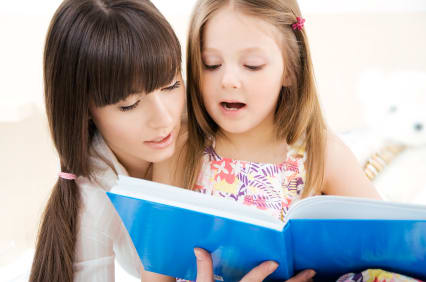I remember well the trouble I had as a child when it came to reading. Not your typical woes, mind you. I loved to read and did it well. I read anything I could get my hands on and was a regular at my local library. No, my problem was that my mother thought I read too much, and studied too little. So, what would any ravenous reader do? I began hiding my small paperbacks inside my big textbooks and pretended to study like the good girl that I was (er, most of the time).
Fortunately or unfortunately for my parents, they did not have the same difficulty with my brothers. They could not be swayed to read anything other than the sports pages. And despite years of trying to draw them to reading, nothing worked. (They still turned out okay.)

My parents, as far as I know, didn’t do much differently when they raised such polar opposite readers. But what if we, as parents, could actively teach our children to love reading and open their eyes to a wonderful world of imagination and adventure?
According to Esme Raji Codell, author of How to Get Your Child to Love Reading, reading is not just a hobby; it is a benchmark for future success. “Thousands of studies by the U.S. Department of Education as well as findings by independent researcher here and abroad consistently credit the utilization of children’s literature for everything from school achievement to emotional development to increased life span and higher standards of living.”
Wow. And to think that all those bonuses can be wrought just from reading.
But now comes the hard part. How can we turn our children into happy, excited readers? Can we transform them into kids who want to read, who can’t wait to get their hands on another book?
Yes!
There are many ways to encourage our children to enjoy reading, and Esme Raji Codell articulates many of them in her book. First and foremost, she maintains that reading aloud is far more crucial than we think. And not just for toddlers or preschoolers. Even older children appreciate and develop from hearing books read aloud. Codell claims that there are sixteen benefits from this one activity, including teaching a child to associate reading with pleasure; providing the child with a reading role model; offering laughter and entertainment as an alternative to television; and nurturing emotional development and self-esteem.
Another important factor is helping children choose books that will interest them, thereby keeping them involved and motivated. Codell likens this to matchmaking skills. “If we are careless,” says Codell, “we will send children on some very boring reading ‘dates.’ As parents, we can vary motivators for reading and keep children engaged as they advance into intermediate and upper grades, a time in which children may already have a ‘history’ of bad book relationships.”
A different issue some parents face is frustration from children who attempt to read books above their level, a factor that can ultimately inhibit enjoyable reading. Codell suggests using her “Rule of Thumb.” This trick has the child choosing a page in the middle of her book and making a fist. She should read the page silently and when she arrives at a word she doesn’t understand, put out her thumb. If she finds more words she doesn’t know, she continues putting out the rest of her fingers. If, at the end of the page, she has between three and five fingers up, that means the book will be tough. If she’s motivated, she can elect to read it and challenge herself. But, Codell cautions, a pleasure read should typically result in zero to two fingers up.
Most important, however, is never giving up on our children as readers. Although they may have trouble, become frustrated, and temporarily swear off reading, the key is to persevere.
As Codell says, “No child is a lost cause when it comes to reading any more than someone is a lost cause when it comes to falling in love.” It’s just a matter of finding “The One.”
The words of this author reflect his/her own opinions and do not necessarily represent the official position of the Orthodox Union.



